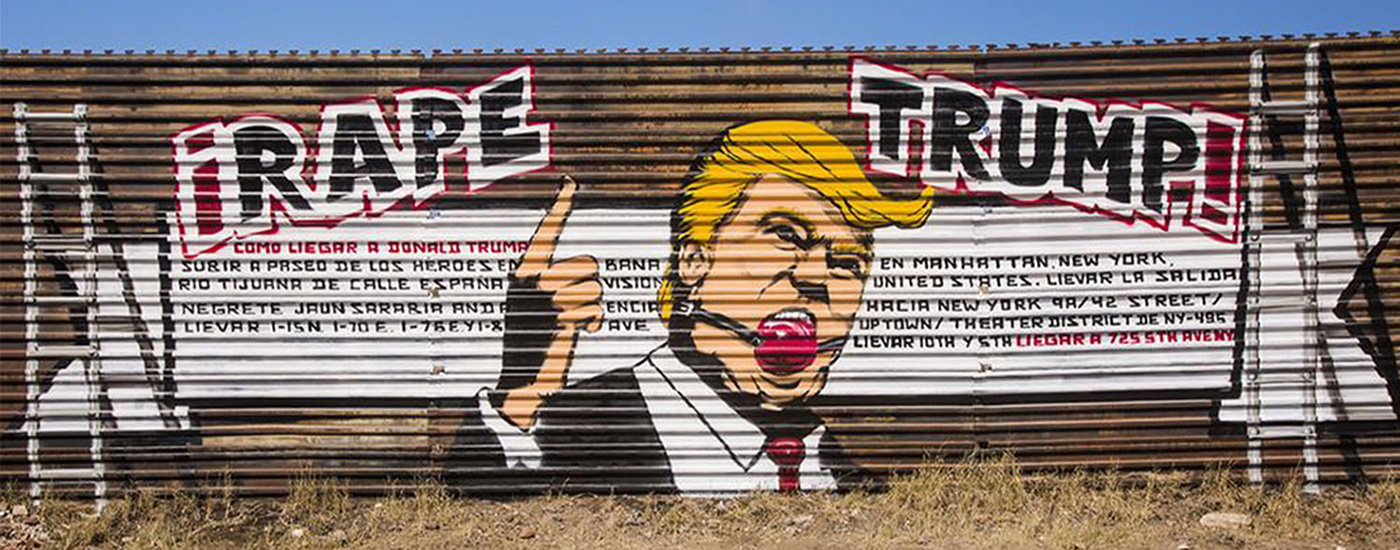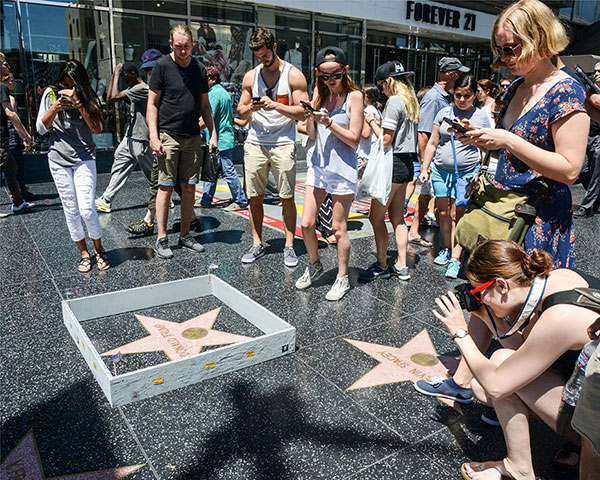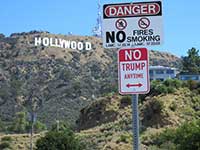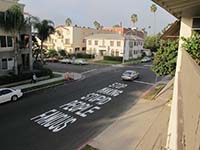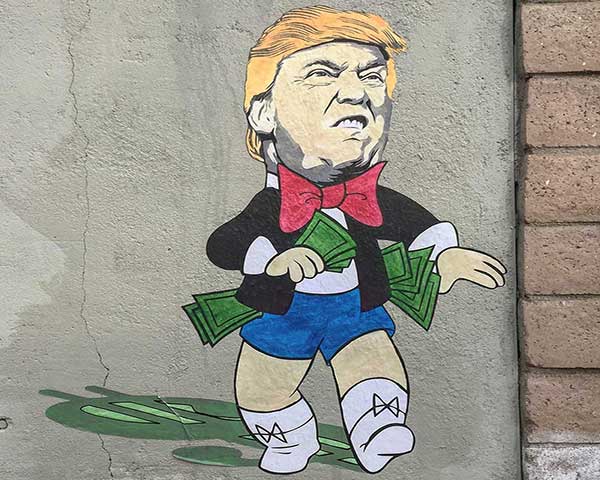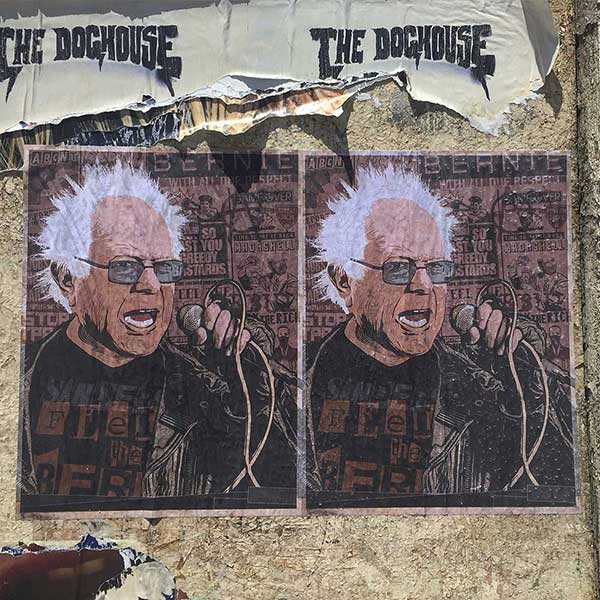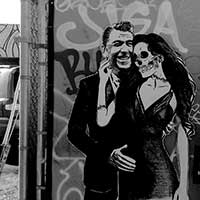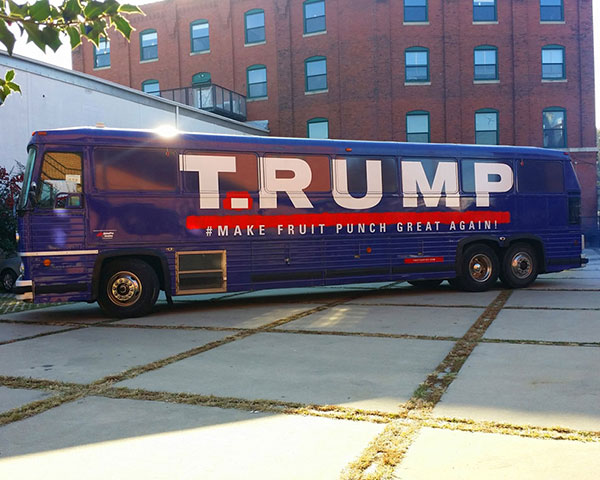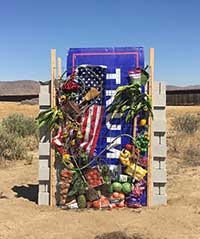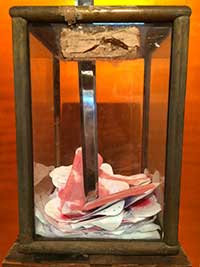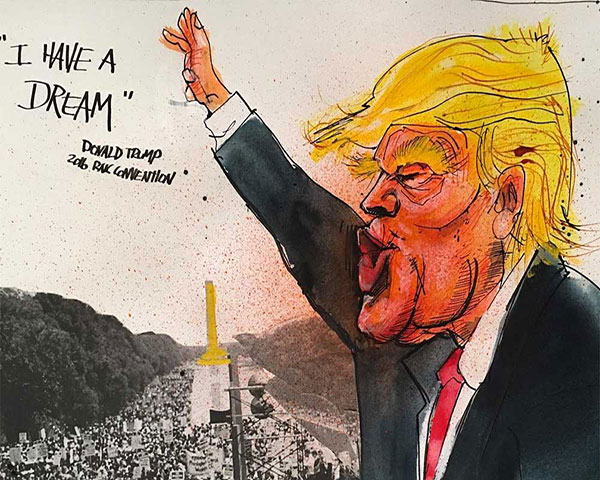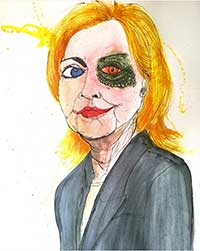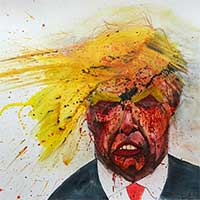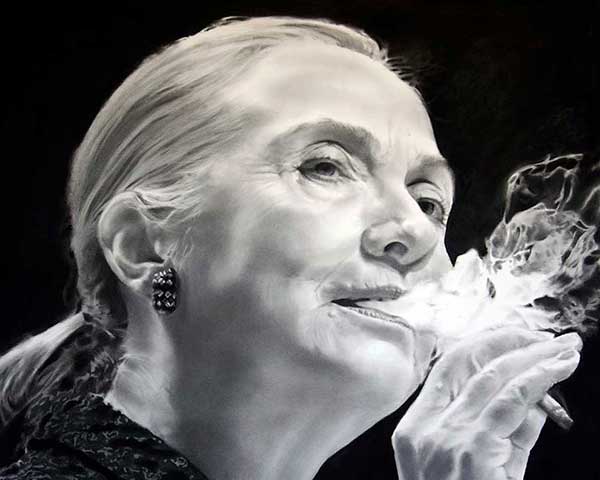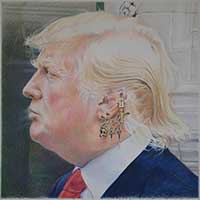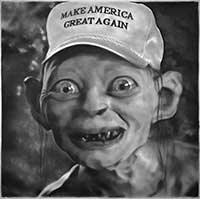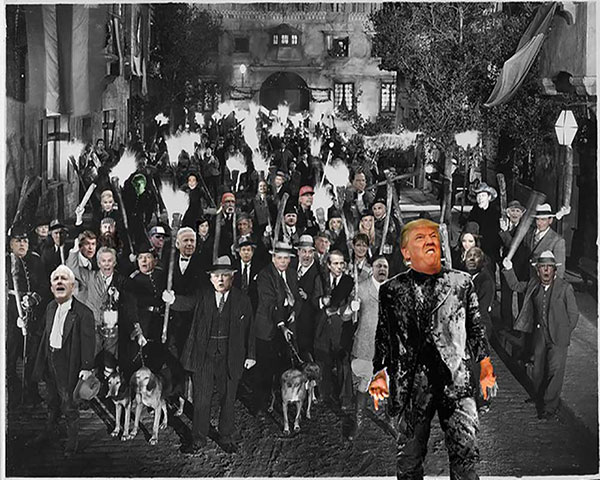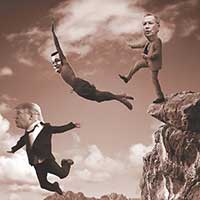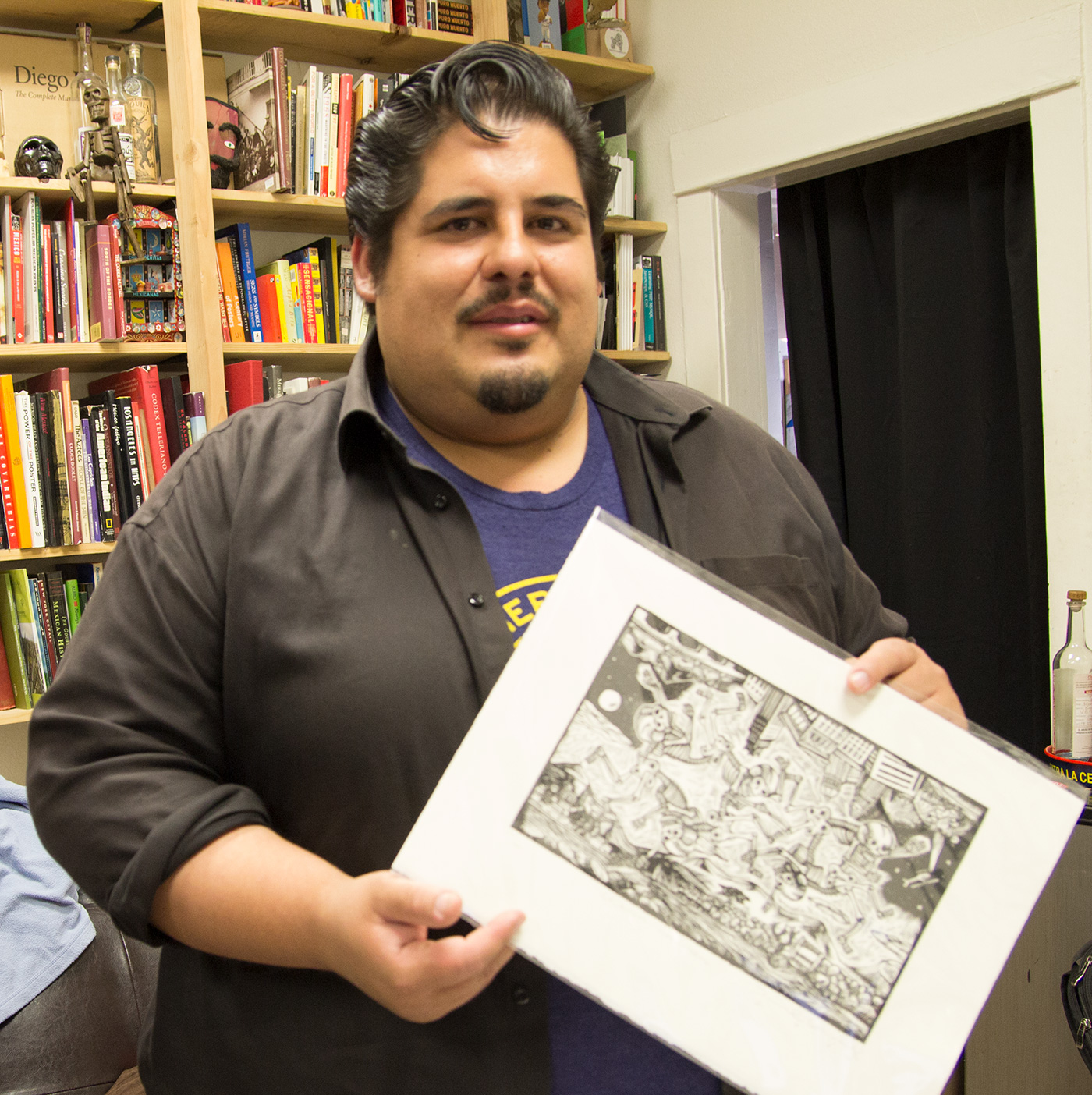Artists in Los Angeles and around the world have found an unlikely muse in Donald Trump.
The Republican nominee’s likeness has recently appeared on city walls as a clump of feces, as Hitler, and as a drag queen. One Parisian bar invites patrons to use his mouth as a urinal. From a mosaic of dick pics to a canvas of menstrual blood to a sculpture made of animal parts, the Republican nominee’s famous visage has undergone a number of creative permutations.
Scroll over the image to hear what LA residents thinks of this art.

Robbie Conal's image of a rage-filled Donald Trump was postered across LA. Image courtesy of Robbie Conal.
Judging by the global sprawl of imaginative anti-Trump work, it’s a great time to be a protest artist. The more unorthodox Trump’s public behavior becomes, the more daring the art. And as the threat of a Trump presidency looms, members of LA’s artistic community say they feel an increasing moral imperative to voice their opposition.
"With Trump, there’s no way I couldn’t do anything. He’s the most dangerous potential demagogue in a long time,” said Robbie Conal, a veteran LA art agitator whose Trump “Bully Pulpit” posters have gained major traction since the real estate mogul became the official Republican candidate. His newest work is a double-sided poster -- a grotesquely exaggerated Trump on one side, while the other side features the candidate’s smug grin framing his infamous “rapists and criminals” comment about Mexican immigrants.
The punchiest and most provocative election art is coming not from inside galleries, but from activist street artists. Their bold approach inherits a long tradition of radical art engagement from dissident activist groups.
“We’re not talking about sanctioned public art,” said Conal. “In my case it’s a minor form of civil disobedience.”
Conal first gained popularity in the ‘80s for his anti-Reagan “Contra Diction” posters, a response to the Iran-Contra affair. He has traded one conservative icon for another. At 72, Conal now leads an army of volunteers, composed mostly of old hippies and Bernie Sanders supporters, who placard LA streets with his anti-Trump posters.
“Thousands and thousands of people see the posters whether they are looking for them or not,” said Conal. “That's a level of engagement in a much more public sphere than a clean white box — an art gallery or a museum.”
Civil Disobedience: Artists get involved
Click on the images below to explore how artists are protesting this election.
Other artists see their work as a way to counter mainstream media’s preoccupation with Trump at the expense of more critical issues.
“I have become more and more frustrated with the mainstream media ignoring issues that really affect most people,” said Plastic Jesus, an LA-based art provocateur responsible for the “No Trump Anytime” parking signs that have been cropping up across LA and other major US cities including New York City and Washington D.C.
INDECLINE, a self-described underground art collective, feels a similar compulsion to speak directly to the public.
“A lot of times we express our disdain for the lack of important things the media publicizes by going out and doing our own thing,” said a leading INDECLINE member who asked that his name not be used. “We want to redirect attention.”
The group brings a punk rock ethos to its ambitious street installations, which are professionally filmed to ensure their messages last beyond the art’s removal. Last summer, after Trump made comments about Mexico sending “rapists” to the US, the group traveled to Tijuana to paint its "¡Rape Trump!” mural, which shows the notoriously mouthy candidate silenced by a ball gag.
“We end up hijacking the media by getting our own stories put out based on our work,” said the INDECLINE spokesman.
Thanks to the new levels of visibility provided by social media, LA street artists say they feel more compelled than ever to counter the media’s preoccupation with Trump’s brazen persona.
“We bother the status quo,” said Danny Gonzalez, an East LA graphic artist whose “Viva Bernie” posters helped rally support for the Democratic candidate in local Latino neighborhoods. “We get people to stop and look.”
Gonzalez credits Robbie Conal’s anti-Reagan posters as one of his main inspirations.
“When you have someone like Trump saying and doing horrible things, I think it's time for people who create visuals, who are makers, to act against it,” said Gonzalez.
Trump’s controversial stances on immigration and national security have impelled artists to address the public directly in increasingly creative ways.
“I don't pretend for one minute that my work will change anything or much at all in society,” said Plastic Jesus, who in July responded to Trump’s pledge to build a barrier between Mexico and the U.S. by constructing a miniature wall around the nominee’s Hollywood Walk of Fame star. “But if I can change one person's opinion or even consider other ways of looking at the issues in the news, then I've done my job.”
Most of the artists don’t believe they can have a major impact on the election outcome. Instead, they say they hope to get the public to think critically.
“I don’t think political art is hooked up to legislative change. That’s not how it works,” said Helen Molesworth, chief curator at LA’s Museum of Contemporary Art. “When artists make political art, they are trying to get people to think critically about a scenario that maybe the public isn’t thinking critically about.”
David Brown, cartoonist for the Los Angeles Sentinel, on the value of political cartoons.
Other street artists have a different approach — engaging directly with the Trump supporters themselves. Art duo t.Rutt believe they found the perfect Trojan horse: an old Trump campaign bus purchased on Craigslist.
“We interact with some protesters too but sometimes we get the thumbs down because they think it’s a pro-Trump bus,” said David Gleeson, one half of t.Rutt. “We live in this netherworld.”
Gleeson and Mary Mihelic, the other half of t.Rutt, have attended dozens of Trump rallies and traveled most of the country in the Trump bus.
“If the bus said ‘We Hate Trump,’ we would never talk to any Trump supporters,” said Mihelic. “So it gets us in the door.”
One side of the bus has Trump’s regular campaign slogan printed on it. t.Rutt decorate the other side with American flags embroidered with Trump’s contentious quotes and tongue-in-cheek satirical elements to remind the bus’s viewers about the alarming comments he has made in the past.
“The back of the bus says ‘Save Water —- only waterboard on Monday, Wednesday, Friday,’” said Mihelic. “Most of the veterans who come by the bus rethink their vote once we remind them of Trump’s stance on waterboarding.”
It’s not only liberal artists who are getting involved this election season. Though Republican artists are much harder to find, that hasn’t stopped LA-based graphic artist SABO from waging a poster campaign against what he calls the “leftist” establishment.
“After George W. Bush was elected, I couldn’t turn around anywhere and not hear someone define me for being a Republican … for being a racist, being a homophobe, being rich,” said SABO. “But I’m none of those things. I noticed there were no artists pleading my case or standing up for me as a Republican. And I kind of figured, screw it, I’ll do it.”
The floor of SABO’s home studio in Century City is littered with pages torn out of the Quran, which visitors must walk on in order to enter his home. His walls are covered with inflammatory art, including a "Black Lives Are Just Matter" plaque and a portrait of President Obama's face emerging from a toilet bowl.
“I don’t think my work is meant to offend,” said SABO. “I think I challenge people to such a degree that maybe I scare them.”
One of SABO’s recent stunts targeted the “Refugee” exhibit at the Annenberg Space for Photography in Century City. In the early morning of Aug. 9, the right-wing artist defaced the bus stop posters promoting the exhibit by substituting the original photographs with images of the terrorist organization ISIS.
SABO: Republican Street Artist
Meet SABO, the LA-based artist whose provocative right-wing posters corner a niche market in the street art scene.
Although painters, cartoonists, and multimedia artists may not receive the same levels of viral attention as street artists, that has not stopped those who work in more traditional mediums from using their art to voice their election concerns.
“It seems as though many more people have the compulsion to make art about this presidential primary and election season than I saw in 2012 and 2008 and 2004,” said artist whose digital-montage pieces have satirized the unconventional turns of the GOP primary race.
Since Trump secured the Republican nomination, Mills has seen an emergence of political artwork, says Amelia Jones, an art history professor at the University of Southern California.Work depicting Democratic candidate Hillary Clinton has been notably absent from the wealth of political art generated during this election season. While the 2008 election saw the iconic Barack Obama “Hope” poster by art star Shepard Fairey, it has been difficult for left-wing artists to generate the same level of enthusiasm for Clinton.
This has not stopped some artists from celebrating the first female nominee of a major political party in their work. Renowned artist Deborah Kass has made an official print for the Democratic candidate, which depicts Clinton’s firebrand Republican opponent with his mouth ajar in mid-rant. Beneath Trump’s face is the scrawl “Vote Hillary.”

Deborah Kass was inspired by Andy Warhol's "Vote McGovern" from 1972 to make her own "Vote Hillary" painting. Image courtesy Deborah Kass.
“It's based on Andy Warhol's Vote McGovern piece from 1972,” said Kass. “It's actually a piece I wanted to make for Bush, but this seemed like a better time to do it.”
MOCA curator Helen Molesworth is now showing Andy Warhol’s anti-Nixon piece in the museum's main collection.
“During the Obama election, I never would have hung the Warhol that said ‘Vote McGovern,’” said Molesworth. “But I'm absolutely going to hang it at a moment when our country has people in it who might vote for Donald Trump.”
The artists who create explicitly political work say it is not intended for the politicians themselves but for the people who vote for them.
David Gleeson of t.Rutt cites the famous Czech playwright and political dissident Vaclav Havel, who was instrumental in toppling the Communist regime in his home country.
“Havel had a great simple line about artists. He said if we are to change our worldview, images must change,” said Gleeson. “Artists have a very important job to do. They’re not just out there entertaining rich people. They really matter.”
